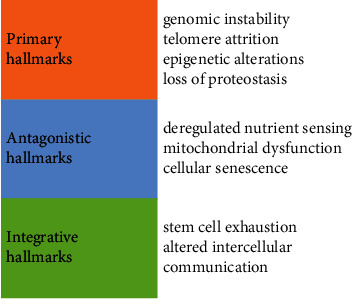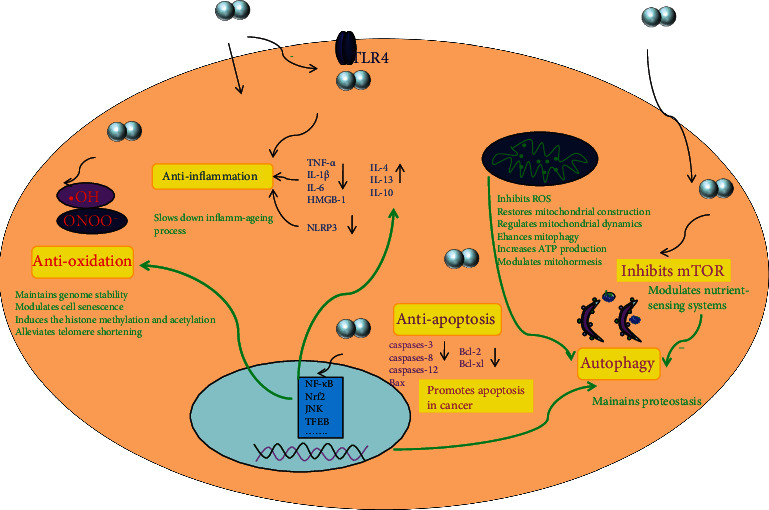Molecular Hydrogen and Its Positive Effects on Aging and Age-Related Diseases
Abstract
The physiological process of aging is inevitable and progressive and is characterized by a decline in the function of organs over time. Molecular hydrogen has remarkable potential for therapeutic and preventive effects that benefit various organs in the body. Hydrogen carries many beneficial antioxidative properties as it can directly neutralize hydroxyl radicals and reduce the level of peroxynitrite. Additionally, it activates Nrf2 and HO-1, which regulate a number of antioxidant enzymes and proteasomes.
The antioxidative effect of molecular hydrogen helps maintain genomic stability and lessens cellular senescence. It also participates in histone modification, assists with telomere maintenance, and facilitates proteostasis. In addition, hydrogen may serve as a preventative measure by regulating inflammation and utilizing the nutrient-sensing mTOR system for autophagy, apoptosis, and mitochondria activities—all factors associated with aging. As such, its application is being explored for various age-related diseases in terms of treatment or prevention, such as neurodegenerative disorders, cardiovascular disease, pulmonary disease, and cancer. Put simply, molecular hydrogen offers a promising choice for health benefits in response to an array of illnesses.
Introduction
Aging is an inevitable process that begins long before the external signs of aging become apparent. It is classified by a gradual loss of function and is almost universal throughout the living world [1]. Although the exact cause of aging is still unknown, researchers have identified several cellular changes that contribute to functional decline during the aging process [2]. These include metabolic alterations, biochemical changes, and changes at the molecular level [3]. Aging is also a major risk factor for chronic noncommunicable diseases such as neurodegenerative diseases, cardiovascular diseases, diabetes, and cancer [4]. Understanding the mechanisms of aging is critical for developing interventions that can delay the onset of age-related pathologies. Despite the significant progress, much remains to be learned about aging and how to delay its effects. Continued research is vital to improving our quality of life as we age.

Hallmarks of Aging
Image Courtesy: NCBI
Skin aging is a complex process that has yet to be fully understood. A variety of different therapeutic interventions have been suggested in an attempt to reverse or slow down the effects of aging, but most have shown only limited success. Although it is often overlooked, molecular hydrogen (H2) gas is crucial in many areas of our lives. It is the lightest of all gas molecules, and its therapeutic effect was first demonstrated in skin cancer treatment [5]. In recent years, studies have shown that H2 can also help to improve lipid and glucose metabolism in patients with mild type 2 diabetes mellitus or impaired glucose tolerance [6]. In addition, a recent study talks about how hydrogen-rich water (HRW) intake favorably affected several aging-related features in healthy elderly, including extended mean telomere length, and tended to improve DNA methylation. These findings suggest that H2 may be essential in preventing or treating aging-related diseases [7]. Further research is required to explore the mechanisms involving the beneficial effects of H2. However, the available evidence suggests that H2 could be a promising tool for delaying or preventing the onset of age-related diseases.
1. Molecular Hydrogen (H2) and Its Prospective Working Process Against Aging
1.1 H2 on Aging Indicator via Antioxidative Effects
Accumulated DNA damage is one of the key contributing factors to aging. A variety of stimuli, including ROS, can cause this damage. H2 has been shown to protect against DNA damage caused by ROS and other stimuli. H2 was shown to significantly reduce nucleobase DNA damage in keratinocytes exposed to UVA radiation [8]. It has also been demonstrated that H2 can effectively protect against DNA damage caused by various stimulations, including radiation and ultraviolet A (UVA) light. In addition, H2 has been shown to reverse the effects of cellular aging, making it a powerful tool in the fight against aging [9].
1.2 H2 on Aging Indicator via Anti-Inflammatory Effects
Inflammation is a universal aging-related process that alters intercellular communication and promotes the development of age-related diseases [10]. H2 is an effective anti-inflammatory agent in various tissues and organs, including the brain. In macrophages, H2 can promote polarization from the proinflammatory M1 type to the anti-inflammatory M2 type. In addition, H2 can encourage the generation of anti-inflammatory cytokines, such as IL-10 and TGF-β [11]. Therefore, finding ways to reduce inflammation throughout the body is essential. Hydrogen gas (H2) has emerged as a potential therapy for inflammation due to its ability to inhibit inflammatory pathways selectively. Studies have shown that H2 can effectively attenuate neuroinflammation in various neurological conditions. These findings suggest that H2 may be a promising therapy for preventing age-related diseases.
1.3 H2 on Aging Indicator via Effects on Mitochondria
Modern medical research has identified nine processes associated with aging, collectively referred to as “hallmarks” of aging. Out of these hallmarks, mitochondrial dysfunction is one of the drivers of age-related damage. Research demonstrates the potential of hydrogen (H2) to treat aging due to mitochondrial dysfunction. It can directly neutralize reactive oxygen species (ROS) and suppress electron leakage within the electron transport chain (ETC), thus regulating energy metabolism inside mitochondria, producing fewer ROS, and reducing oxidative stress. In addition, it can block the opening of mitochondrial permeability transition pores and restore cell structure, allowing improved energy transfer and increasing energy metabolism efficiency [12]. This study raises the intriguing prospect of H2 being used as a novel approach to combat age-related disorders and extend lifespan in the near future.
1.4 H2 on Aging Indicator via Apoptosis
Recent studies have shown that H2 can modulate apoptosis, a process of programmed cell death associated with many disease states, including cancer and aging. In general, H2 protects tissue from injury through its anti-apoptotic effects. H2 has been shown to increase early and late apoptosis rates in lung cancer and reduce proliferation rates of carcinoma cells [13, 14]. Additionally, it may significantly contribute to the scavenging of carcinoma cells in the body through its pro-apoptotic actions. Molecular hydrogen’s ability to contribute to both anti- and pro-apoptotic activity suggests that it may play an important role. H2 might interplay between aging hallmarks and apoptosis implementation in humans.
With careful research into its anti-aging mechanisms, we can tap into H2’s powerful potential to promote healthy function and longevity for our bodies.

Image Courtesy: NCBI
2. H2 Therapy: An Interceptor Against Aging-Related Diseases
2.1 The Effects of H2 on the Heart
Hydrogen gas (H2) has been shown to have various protective effects on the heart, from preventing myocardial infarct injuries to alleviating cardiac hypertrophy and heart failure. Specifically, hydrogen-rich saline (HRS) significantly decreased inflammation and apoptosis caused by myocardial ischemia/reperfusion injury. This could be attributed to its ability to activate PINK1/Parkin-mediated mitophagy [15]. Furthermore, inhalation of low concentrations of H2 gas (2%) improved myocardial stunning in swine models. When the concentration was increased to 4%, it resulted in a significant reduction in the size of myocardial infarcts [16].
Additionally, chronic treatment with HRS efficiently decreased left ventricular hypertrophy in rats. It inhibited NF-κB activation and associated proinflammatory cytokines, therefore, reducing pressure overload-induced interstitial fibrosis and decreasing cardiac dysfunction [17]. These findings further highlight the potential for H2 gas, or HRS, to be used therapeutically for protection against various cardiovascular disorders.
2.2 The Effects of H2 on Blood Vessels
Vascular aging significantly contributes to the onset of cardiovascular diseases (CVDs). These age-related changes stem from various factors, including endothelial dysfunction, inflammation, and calcification in vascular smooth muscle cells (VSMCs) [18, 19]. By consuming hydrogen-rich water, levels of oxidized low-density lipoprotein (LDL), or “bad” cholesterol, are decreased and those of high-density lipoprotein (HDL), or “good” cholesterol, are improved. Additionally, it helps to regulate glucose metabolism [20, 21]. One of the mechanisms for this is believed to be hydrogen’s ability to reduce oxidative stress, suppress inflammation, conserve mitochondrial function, and modulate nitric oxide bioavailability. These changes were documented in studies involving hypertensive rats showing that drinking hydrogen-rich water offers protection against age-related vascular decline by improving baroreflex sensitivity [22]. Therefore, hydrogen-rich water has the potential to be a preventative therapy against age-related CVDs.
2.3 The Effects of H2 on Pulmonary Disease
Idiopathic pulmonary fibrosis (IPF) and chronic obstructive pulmonary disease (COPD) are regarded as diseases of accelerated aging, exhibiting the classic hallmarks of age-related pulmonary deterioration [23]. As the fourth leading cause of death worldwide, the prevalence of COPD is increasing, particularly among older populations [24]. Hydrogen therapy (H2T) may offer a novel and effective treatment for COPD with anti-inflammatory, antioxidant, and anti-apoptotic effects. In animal experiments, H2T has been proven to significantly alleviate COPD-related symptoms caused by cigarette smoke exposure significantly. Moreover, it reduces small airway remodeling and goblet cell hyperplasia in the tracheal epithelium and greatly diminishes inflammatory cells within bronchoalveolar lavage fluid (BALF) [25, 26]. Similarly, the inhalation of 2.4% hydrogen-containing steam mixed with gas over a period of 45 minutes was found to have attenuated the inflammatory status in patients with both asthma and COPD in clinical studies [27]. These preclinical findings provide support for H2T being a potentially viable treatment option for pulmonary diseases associated with accelerated aging.
2.4 The Effects of H2 on Metabolic Diseases
Chronic obstructive pulmonary disease (COPD) and idiopathic pulmonary fibrosis (IPF) are regarded as diseases of accelerated aging, exhibiting the classic hallmarks of age-related pulmonary deterioration. As one of the leading causes of death worldwide, the prevalence of COPD is increasing, particularly among older populations. Hydrogen therapy (H2T) may offer a novel and effective treatment for COPD with anti-inflammatory, antioxidant, and anti-apoptotic effects. Recent research has highlighted the potential benefits of hydrogen-rich water (H2) consumption in helping to mitigate the symptoms of DM (diabetes mellitus). This was seen mainly in male db/db mice, which exhibited improved levels of obesity, hyperglycemia, and plasma triglyceride when drinking H2 for extended periods.
Moreover, fasting blood glucose was significantly reduced due to H2 consumption, like that seen with diet restriction. The molecular mechanisms underlying these improvements were found to involve an increased expression of hepatic fibroblast growth factor 21 (FGF21), a hormone with functions related to fatty acid and glucose expenditure [28]. This indicates that H2 could benefit insulin resistance and its associated disorders, such as DM, on a cellular level by reducing oxidative stress and increasing antioxidant defense systems. Thus, it may be possible to partially offset age-related health issues through dietary supplements such as H2.
Conclusion
The 21st century has seen a dramatic surge in many aspects of life, which is certainly true of modern medicine. Technology advancements have allowed us to tackle issues that were once considered untreatable, such as intractable diseases and aging. Now we are seeing the emergence of H2 gas as a “philosophical molecule” offering potential solutions to some of these problems [29]. Studies have indicated that H2 has a good safety profile when administered properly, and it is now being used alone or synergistically with other treatments to help combat various conditions. Its potential effects on aging are fascinating due to its ability to modulate autophagy, mTOR, mitochondria, and apoptosis, among others. Although further research is needed to determine how H2 affects the aging process, its positive effects on chronic health make it an encouraging prospect for treating age-related diseases and prolonging a healthy lifespan. The hope is that in the years ahead, we will be able to harness H2 gas to reduce suffering from age-related ailments and improve the quality of life for people worldwide. This would undoubtedly be a significant breakthrough for modern medicine, providing optimism for the future.





